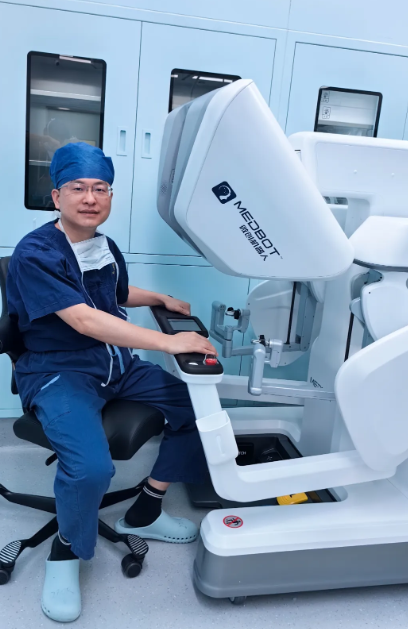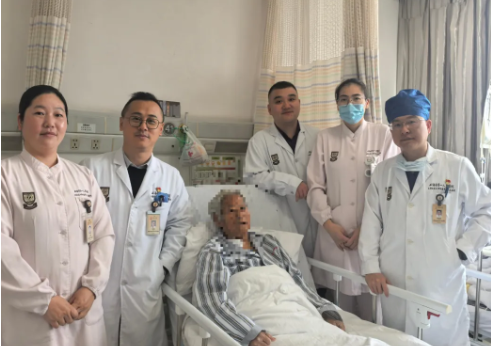- News
Shanghai General Hospital (Southern Campus) Successfully Performs Its First Robot-Assisted Surgery for Dual Cancers of Pancreas and Kidney
https://mp.weixin.qq.com/s/GEa87bJuPn0z3MVmqpajqA
Recently, the Hepatobiliary and Pancreatic Surgery Department and the Urology Department of Shanghai General Hospital (Southern Campus) collaborated to successfully remove two separate cancers in a patient using robotic assistance. This achievement marks a significant step forward in precise and minimally invasive treatment.
Cancer is often feared as a life-threatening diagnosis, but for 75-year-old Ms. Wang, her situation was particularly challenging—she was simultaneously diagnosed with pancreatic cancer and kidney cancer. For the past six months, Ms. Wang, who resides in Ningbo, had been experiencing upper abdominal pain and noticeable weight loss, prompting her to seek medical attention at our hospital. Following examinations by the Hepatobiliary and Pancreatic Surgery Department, she was diagnosed with a pancreatic body and tail tumor. Further evaluations revealed a mass in her right kidney, which the Urology Department suspected to be primary renal cancer. This indicated the possibility of Ms. Wang having two primary malignancies: pancreatic cancer and kidney cancer.
Dr. Sun Hongcheng, Director of the Hepatobiliary and Pancreatic Surgery Department, who has nearly two decades of professional experience, noted that such cases are rare. While providing reassurance to Ms. Wang's family, Dr. Sun actively communicated with other departments to develop a treatment plan. Under the coordination of hospital leadership and the Medical Affairs Office, a multidisciplinary discussion involving the Hepatobiliary and Pancreatic Surgery Department, Urology Department, Anesthesiology Department, Oncology Department, Radiology Department, Ultrasound Department, and ICU was conducted. The consensus was that minimally invasive surgery would be the optimal treatment for Ms. Wang.
The team faced a dilemma: whether to perform the surgeries separately or simultaneously. A staged approach would reduce surgical risk but subject the patient to two operations, increasing physical trauma, emotional stress, and financial burden. It might also delay treatment of one tumor, risking progression or metastasis. Conversely, simultaneous surgery would heighten surgical complexity and risk, particularly given Ms. Wang’s underlying conditions, including hypertension, heart disease, and diabetes. These factors increased the likelihood of postoperative complications such as pancreatic leakage, bleeding, or infections, potentially necessitating further surgical interventions.
Simultaneous surgery for pancreatic and kidney cancers is extremely rare, both nationally and globally. The complexity and risk pose a significant challenge to the surgical team and the anesthesiology department. After thorough consideration, the team decided on a simultaneous robotic-assisted radical resection of both cancers. This was the first robotic-assisted minimally invasive surgery performed by the General Surgery Department of the Southern Campus. Robotic-assisted surgery not only enhances precision and thoroughness but also minimizes bleeding and shortens hospitalization. For Ms. Wang’s case—pancreatic body and tail cancer on the left and right-sided clear cell renal carcinoma—robotic surgery avoided the severe trauma of traditional open surgery, which would have resulted in two large 20-centimeter scars. Instead, the minimally invasive approach maximized surgical outcomes while minimizing trauma.
After meticulous preoperative preparation, on November 11, 2024, Ms. Wang was brought to the operating room. Following successful induction of general anesthesia with intubation, the Urology Department team led by Dr. Jiang Qi performed a right nephrectomy with the patient in a left lateral decubitus position. The patient was then repositioned supine, and Dr. Sun Hongcheng’s team from the Hepatobiliary and Pancreatic Surgery Department utilized three additional robotic ports to perform a radical resection of the pancreatic body and tail cancer. Intraoperative blood loss was approximately 50 ml. A single 5-centimeter midline abdominal incision was used to extract both the pancreatic and renal specimens, minimizing surgical trauma. Thanks to the close collaboration with the anesthesia and operating room teams, the six-hour surgery was successfully completed. Postoperatively, Ms. Wang experienced minor pancreatic leakage, which improved with adequate drainage. She did not develop renal hemorrhage or other complicaions and was discharged in good health under the meticulous care of the medical staff. Ms. Wang and her family expressed their heartfelt gratitude for the team’s exceptional medical expertise and high-quality care.

Hepatobiliary and Pancreatic Surgery Team in Action

Lead Surgeon for Pancreatic Body Cancer, Dr. Sun Hongcheng

Surgical Team Photo

Discharge Photo
(From left to right: Nurse Wang Mei, Dr. Jiang Qi, patient Ms. Wang, Dr. Yu Yang, Nurse Zhou Ling, Dr. Sun Hongcheng)
This successful surgery highlights the improved multidisciplinary collaboration and minimally invasive surgical capabilities of Shanghai General Hospital (Southern Campus). Going forward, similar procedures will become routine, providing more patients with superior treatment options.
From preoperative planning to postoperative recovery, every step of this surgery involved extensive multidisciplinary discussion. As a member of the tumor MDT (multidisciplinary team), the Hepatobiliary and Pancreatic Surgery Department regularly holds case discussions, covering conditions such as liver cancer, bile duct cancer, gallbladder cancer, and pancreatic cancer. This team aims to create a comprehensive medical platform involving experts from various disciplines to provide the most standardized, effective, and safe individualized treatment plans for complex, critical, and challenging cases. Shanghai General Hospital is committed to safeguarding the health of people in Shanghai and across the nation.
Reporter: Yu Yang
